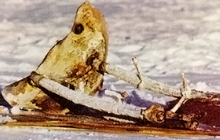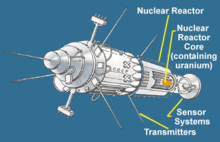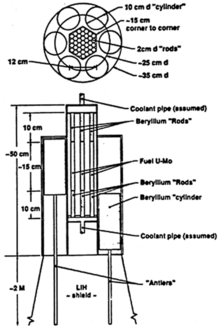- Kosmos 954
-
Kosmos 954 (Russian: Космос 954 meaning Cosmos 954) was a Soviet Radar Ocean Reconnaissance Satellite (RORSAT) with an onboard nuclear reactor.[1][2] The satellite was launched on September 18, 1977 and was designed to track nuclear submarines.[3] The satellite's reactor core failed to separate and boost into a nuclear-safe orbit, and instead remained on board in an orbit that decayed until the satellite reentered Earth's atmosphere (the USSR informing the US in secret meetings)[2] on January 24, 1978 at 11:53 AM GMT.[4][1] Debris from the satellite was deposited on Canadian territory, including portions of the Northwest Territories (some of which is now Nunavut), Alberta and Saskatchewan, [4][1] on a 600-kilometre (370 mi) path from Great Slave Lake[5] to Baker Lake. In an attempt to recover radioactive material, a search was conducted covering a total of 124,000 square kilometres (48,000 sq mi).
The USSR claimed that the satellite had been completely destroyed during re-entry.[2] Subsequent recovery efforts, named Operation Morning Light, by a joint Canadian-American team[2] swept the area by foot and air in Phase I from January 24, 1978 to April 20, 1978 and Phase II from April 21, 1978 to October 15, 1978.[1] They were ultimately able to recover 12 larger pieces of the satellite. All but two fragments recovered were radioactive. [1] These pieces displayed radioactivity of up to 1.1 sieverts per hour, yet they only comprised an estimated 1% of the fuel. "One fragment had the (lethal) radiation of 500 R/h, which is 100 times higher than the maximum annual [per-person] radiation level of 5 rem."[6] For these recovery efforts, the Canadian government billed the Soviet Union $6,041,174.70 for actual expenses and additional compensation for future unpredicted expenses; the U.S.S.R. eventually paid the sum of three million Canadian dollars.[4]
See also
- Liability Convention, regarding the effects of satellite re-entry
- Kosmos satellite program
References
- ^ a b c d e Settlement of Claim between Canada and the Union of Soviet Socialist Republics for Damage Caused by "Cosmos 954" (Released on April 2, 1981)
- ^ a b c d Glenn H. Reynolds, Robert P. Merges, Outer Space: Problems of Law and Policy. Westview Press, 1998, p. 179-189
- ^ TIME Magazine, Nation: Cosmos 954: An Ugly Death, Feb 6 1978
- ^ a b c Marietta Benkö et. al., Space law in the United Nations. Martinus Nijhoff Publishers, 1985, p.49-51.
- ^ Baker, Howard A. (1989). Space debris: legal and policy implications. Nijhoff. p. 66. ISBN 9780792301660.
- ^ Benko, 1985, p.50,78
External links
- Radiation Geophysics - Operation Morning Light - A personal account A detailed first-hand account of recovering pieces of Kosmos 954; includes pictures.
- Note verbale dated 19 December 1978 from the Permanent Mission of Canada to the United Nations Description and location of recovered pieces.
- Gus W. Weiss (Spring 1978). "Life and death of Cosmos 954" (PDF). Studies in Intelligence (U.S. Central Intelligence Agency). http://www.loyola.edu/departments/academics/political-science/strategic-intelligence/intel/cosmos954.pdf#search=%22cosmos%22.
- 1978 Cosmos 954 and Operation Morning Light
Categories:- Artificial satellites formerly orbiting Earth
- Kosmos satellites
- Reconnaissance satellites of the Soviet Union
- Canada–Soviet Union relations
- 1978 in the Soviet Union
- Nuclear power in space
Wikimedia Foundation. 2010.



